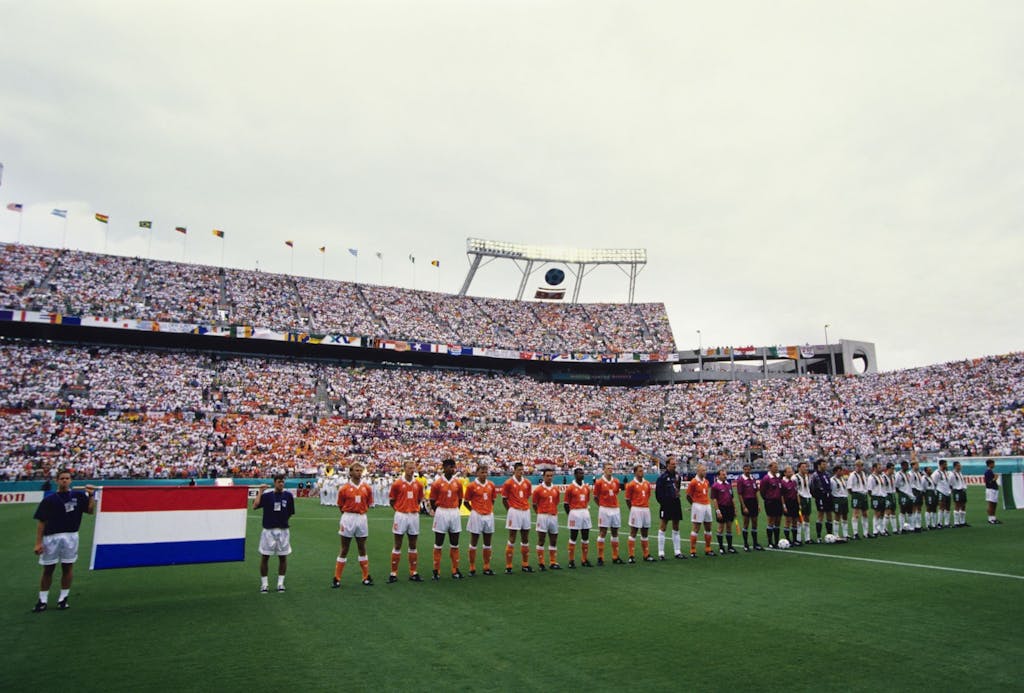 With hindsight, we can quantify the economic impact of the 1994 Fifa World Cup on the City of Orlando. We have the data. Many millions of dollars in community benefits – full hotels, buoyant retail, busy restaurants, record-setting beer sales, and increased inflows of visitors. We have lived the legacy – an explosion in soccer growth.
With hindsight, we can quantify the economic impact of the 1994 Fifa World Cup on the City of Orlando. We have the data. Many millions of dollars in community benefits – full hotels, buoyant retail, busy restaurants, record-setting beer sales, and increased inflows of visitors. We have lived the legacy – an explosion in soccer growth.
But sport is about more than data.
My mind goes to Ireland v Holland on the fourth of July, 1994, and The Citrus Bowl (now Camping World Stadium) is a sea of orange and green. Dennis Bergkamp and the imperious Holland team were proving too good for Jack Charlton’s Ireland, who’d become local heroes inside and outside the stadium, adorning our city with their wit and friendship.
The game was effectively over, and Ireland was going home.
Then something happened. The stadium’s green side started singing, tens of thousands of Irish voices, mixed with those of Florida residents who had joined them on the ride. Soon, the traveling Dutch support caught on, and over 60,000 people came together to belt out the anthem from Monty Python’s Life of Brian.
“Always Look on the Bright Side of Life”.
It’s a sentiment that was both perfect back then and captures the current moment: If the last year has taught us anything, it’s that sport is both unimportant and vital.
This year, Orlando is one of 17 great American cities competing for selection to host games at the 2026 Fifa World Cup, along with three cities from Mexico and Canada. And the stakes are high, both for Fifa and the cities that will host matches.
Seen through the grim lens of 2020, this tournament is like a dream of the future, of unselfconscious joy between people from around the world, not socially-distanced; traveling together to be part of stadiums’ shared experience with fan parks and city squares.
Some things will be the same. Some are going to be different.

There were 24 teams in 1994, there will be 48 in 2026, putting a premium on flawless delivery. More teams, more games, more fans, more journeys, more flights, more hotel rooms, more security, more staff.
Another change is that Fifa has centralised the event management and host city selection process.
In ’94, this was the job of the Local Organising Committee, under US Soccer Federation president Alan Rothenberg. He said Disney World Orlando’s status as one of the most-visited entertainment attraction in the world – and the city’s tourist infrastructure – were ‘the deciding factor’ in the decision to award games to the Orlando last time around.
More recently, the Covid pandemic has meant that Orlando and Disney World have assumed a new role in the resumption of American sporting life.
The Disney Orlando ‘bubble’ enabled the NBA and MLS seasons to be played without a single Covid infection. Canceling the NBA season outright would have cost more than $1bn (€830m). MLS was also facing a $1bn loss in revenue due to the pandemic. The NBA spent $180m to operate 100 days of basketball in the bubble, saving $1.5bn in projected media and sponsorship revenue.
The city is also currently home to the US women’s national soccer team’s first training camp of 2021, along with two matches against Columbia at Exploria Stadium later this month and all of the SheBelieves Cup matches in February. Concacaf recently staged the finals of its prestigious Scotiabank Concacaf Champions League here.
The extraordinary events of 2020 have made certain the most precious commodity in sport; every major event holder is seeking assurances that things will happen safely, on time, and within budget.
The Economic Impact study for the United Bid, prepared by the Boston Consulting Group, has estimated that hosting the 2026 Fifa World Cup will benefit individual host cities by up to $480m. We believe it will eclipse that and overall, it could create more than $5bn of economic activity for North America. This translates to a net community benefit of $3-4bn after factoring in potential public costs.
Fifa is expected to profit significantly from 2026 too. Its new hosting model relies on city government support and a reasonable cost base. This translates into higher returns for the governing body, while the US delivers on its full potential as a soccer nation.
Too often, a major event legacy is judged prematurely, short-changing both the impact of the event on the city and the country.
Orlando hosted five World Cup games in 1994 and – given the 32-year gap between then and 2026 – we have a useful timescale to assess the effect. Our region has been a crucible of soccer growth since the emergence of Orlando City Soccer and its sibling teams. 62,510 fans watched Orlando City’s inaugural MLS match inside of Camping World Stadium. Youth soccer activity in Orlando has tripled, one sport where there’s exponential growth in North America and an explosion of talent is emerging from the Sunshine State.
And that, to quote our Irish friends from ’94, feels a lot like the bright side of life.